Photographs: India Abroad Archive
From drawing cartoons with potent messages to etching for himself a larger-than-life image on Maharashtra's political landscape, Bal Thackeray was the mascot of Marathi pride and Hindutva who aroused extreme emotions but could never be ignored.
A rabble-rouser, the 86-year-old Shiv Sena supremo was idolised with almost God-like devotion by his frenzied sainiks and demonised in equal measure by detractors.
The maverick ways of Thackeray -- Maharashtra's tallest leader -- always led both his friends and rivals to underestimate him politically as he called the shots in state politics, often playing the role of a kingmaker without himself becoming the king. For some, the Tiger of Maharashtra was also a cultural icon.
Thackeray, a fiery orator who could bring the country's bustling financial capital to a standstill with a wave of his finger, started out as a cartoonist alongside R K Laxman at the English daily Free Press Journal in the late 1950s. But he soon charted a new course when he launched a cartoon weekly 'Marmik' in 1960.
The weekly contained satirical pieces that fired up the "Marathi manoos" to fight for their identity and existence in a city witnessing growing influx of migrants.
Please ...
Balasaheb Thackeray: The Tiger of Maharashtra
Image: Bal Thackeray receiving senior BJP leader L K Advani at his residence in Mumbai.Photographs: India Abroad Archive
Thackeray's pro-Marathi plank, that propounded 'Maharashtra for Maharashtrians', saw his party breaking ranks with his long-standing ideological ally BJP in 2007 presidential election when he chose to back UPA's presidential nominee, Pratibha Patil, who is a Maharashtrian.
He even criticised cricket icon Sachin Tendulkar in 2009 for remarking that Mumbai belonged to the whole of India.
Thackeray took to politics as fish to water as he launched Shiv Sena on June 19, 1966 to champion the cause of Marathi 'sons-of-the-soil', seeking job security for Maharashtrians, who were then facing stiff competition from Gujaratis and south Indians.
The frail-looking Thackeray, through his fiery oratory skills, caught the imagination of young Maharashtrians which many felt bordered on jingoism and chauvinism.
Please ...
Balasaheb Thackeray: The Tiger of Maharashtra
Image: Former Prime Minister Atal Bihari Vajpayee and Bal Thackeray greeting visitors in "Matoshree"Photographs: India Abroad Archive
Born on January 23, 1926, he was the second of four children of Kesav Sitaram Thackeray, a writer who actively participated in the 'Samyukta Maharashtra Andolan' -- the movement for creation of a separate state for Marathi-speaking people with Bombay as its capital.
The self-confessed admirer of Adolf Hitler soon raised a veritable army of street fighters whom he would use to obtain jobs for the Maharashtrian youth in numerous textile and other industrial units dotting Bombay, earning the epithet of 'Hindu Hriday Samrat' (emperor of Hindu hearts), in the process.
Though Thackeray never contested an election himself, he sowed the seeds of a full-fledged party when his Shiv Sainiks began controlling trade unions in a variety of industries, including Bollywood.
Shiv Sena grew fast into a well-oiled political machine and gained control over the Brihanmumbai Municipal Corporation in the 1980s, riding the pro-Marathi plank.
Thackeray's biggest moment in politics came when he struck an alliance with Bharatiya Janata Party in 1995 and formed its government in the state for the first time after tempering his strident pro-Marathi ideology and embracing a broader Hindu nationalist agenda. He ran this government by what he himself called a "remote control". However, he never occupied the post of chief minister.
Many believe the communal riots in the aftermath of the 1993 Mumbai blasts in which Shiv Sainiks were alleged to have played the pivotal role, polarised Hindu votes to the advantage of the Sena-BJP combine.
A judicial commission, headed by Justice B N Srikrishna, which had probed the riots, accused Thackeray of sparking anti-Muslim violence in Mumbai, which claimed over 1,000 lives.
Justice Srikrishna described Thackeray as a "veteran general who commanded his loyal Shiv Sainiks to retaliate by organised attacks against Muslims" during the riots.
Please ...
Balasaheb Thackeray: The Tiger of Maharashtra
Image: The funeral procession of Bindumadhav Thackeray, son of the Shiv Sena chief, passing through Mumbai.Photographs: India Abroad Archive
A firm believer in aphorism that familiarity breeds disregard, Thackeray meticulously created a larger-than-life image of himself, eschewing mingling with supporters and making up for that by giving grand 'darshan' from the balcony of his heavily-guarded Bandra home Matoshree and giving rabble-rousing speeches at his famous Dussehra rallies.
In December 2003, Shiv Sena activists damaged the cricket pitch at Agra which was supposed to host a match between Pakistan and India. In April 2005, Bharatiya Vidyarthi Sena, the students wing of Shiv Sena, attempted to prevent an India-Pakistan one day International in New Delhi.
Thackeray also targeted Bollywood icon Dilip Kumar, after he was presented Pakistan's highest civilian award. In 2010, Shiv Sena threatened to stop release of Shah Rukh Khan starrer "My Name is Khan" over the actor's remarks favouring inclusion of Pakistani cricketers in IPL.
Seated on a throne with multiple images of a tiger, Thackeray virtually lorded over Mumbai for years, receiving political leaders, captains of business and industry and film personalities at his residence, all without holding any position of power.
Please ...
Balasaheb Thackeray: The Tiger of Maharashtra
Image: Bal Thackeray offering Ganga water to his son, Bindumadhav, who died in a car accidentPhotographs: India Abroad Archive
He was known as much for his unconventional views, which he never fought shy of airing, as for his assiduously created persona, at times leading to run-ins with the law.
His penchant for strident speeches landed him in trouble when he was disenfranchised for six years between December 11,
1999 and December 10, 2005, following a high court ruling and Election Commission notification for appealing to the people to vote on communal lines.
Thackeray was a considerably mellowed man later in life when he said in his party mouthpiece "Saamna", "I am not against every Muslim but only those Muslims who live in this country but don't obey the law of the land."
After the July 11, 2006 train bombings in Mumbai in which 187 people were killed, he "saluted" Muslims who joined in observing a two-minute silence to mourn the dead.
Known for his anti-migrant views, Thackeray ruffled the feathers of Hindi-speaking politicians when he described Biharis as a "burden" in many places in the country in the aftermath of attacks on north Indians by activists of MNS, floated by his nephew Raj Thackeray.
For all his fulminations against Biharis, Thackeray was all praise for chief minister Nitish Kumar for ushering in development in the backward state.
Please ....
Balasaheb Thackeray: The Tiger of Maharashtra
Photographs: India Abroad Archive
In an interview to a national English daily, Thackeray was once quoted as having praised even Hitler.
"Hitler did very cruel and ugly things. But he was an artist, I love him (for that). You have to think (about) the magic he had. He was a miracle...killing Jews was wrong. But the good part about Hitler was that he was an artist. He was a daredevil. He had good qualities and bad. I may also have good qualities and bad," Thackeray had said.
His views on the Fuehrer illustrated his own persona that seamlessly blended the affectionate tenderness of an artist that emotionally bound generations of Maharashtrians to the Shiv Sena, and the calculated aggression of a hard-boiled, tough-talking politician.
In 1991, Thackeray's party suffered its first major blow when Chhagan Bhujbal, who had served twice as Sena's mayor of Mumbai, defected to Congress in protest against Thackeray's opposition to the Mandal commission report on reservations for OBCs.
Thackeray suffered a personal loss when his wife Meena died in 1995. The next year, Thackeray's eldest son Bindumadhav died in a road accident.
The biggest setback Thackeray received was in 2005, when Raj, his nephew, left Shiv Sena and formed his own political party, MNS, in 2006, a development that also dashed Sena-BJP's hopes to return to power.
Thackeray's health had of late been failing him. At Sena's Dussehra rally in Mumbai on October 24, the "tiger's roar" was missing. In a video-recorded address, he virtually announced his retirement from public life and urged his followers to stand by son Uddhav and grandson Aditya, setting out the succession plan in Shiv Sena.

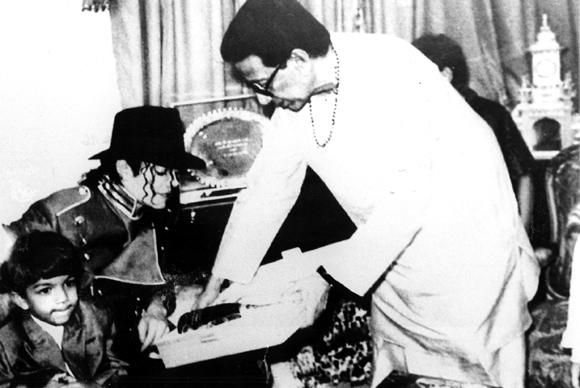
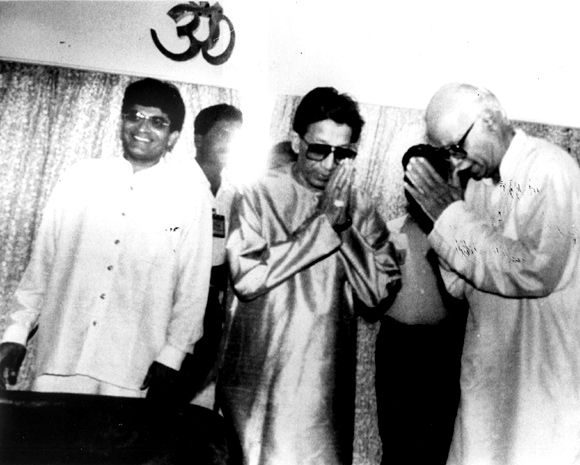
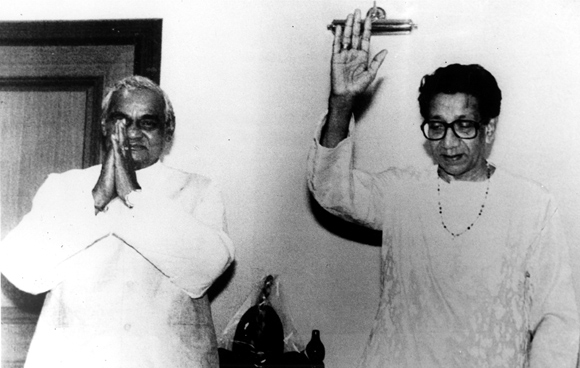
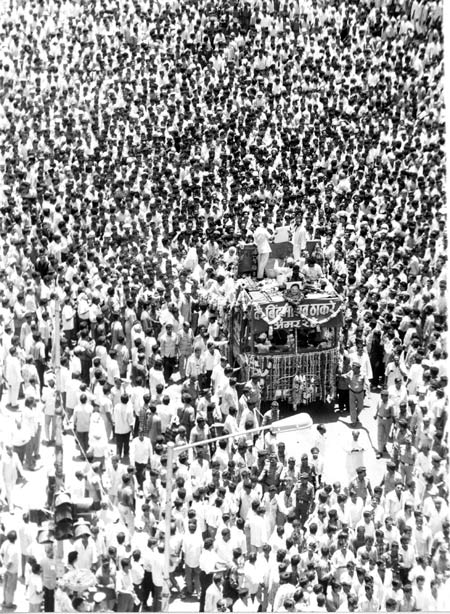
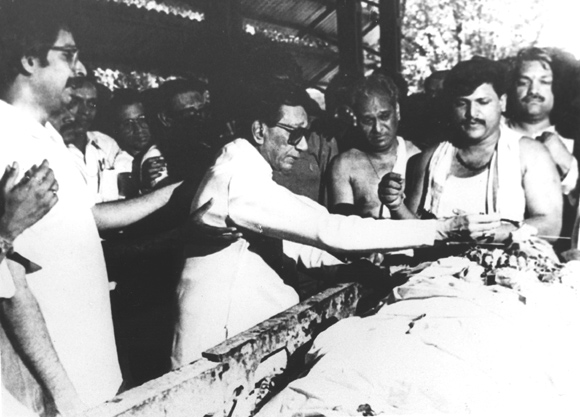
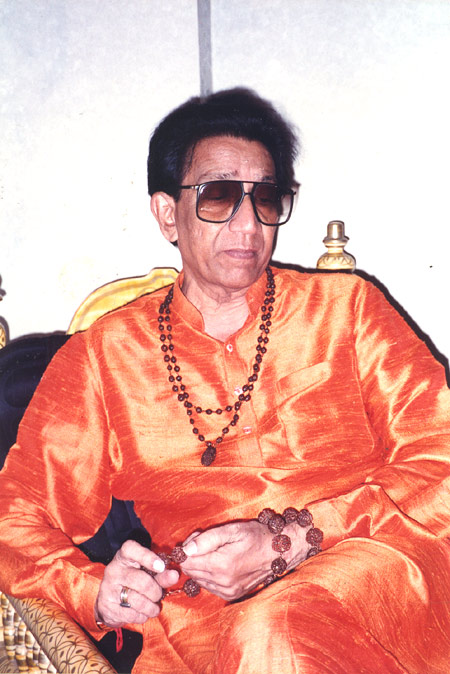
article